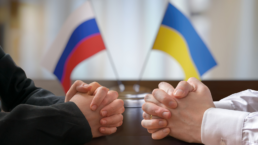Ordinary Ukrainians on the front lines are divided on a ceasefire and negotiations
By Gerard Toal, The Irish Times
Talking peace is not popular in Ukraine right now. Given the context this is understandable. Russia is terrorising Ukrainians in their homes with missiles and drones. Its attacks on Ukraine’s infrastructure – its electricity grid, water and heat systems – threaten millions with a cold, dark winter. This follows the brazen annexation of four Ukrainian regions. No one forgets the Russian military’s war crimes against civilians. Russian officials talk peace because they want to consolidate their territorial gains. Ukraine scorns peace now because it has momentum on the battlefield. It wants the peace of the victorious.

It has always been the case that the more Ukraine wins on the battlefield, the more dangerous this geopolitical crisis becomes. Russian president Vladimir Putin cannot countenance losing and has made nuclear threats that US president Joe Biden, Ukrainian president Volodymyr Zelenskiy and French president Emmanuel Macron acknowledged are serious. Biden was blunt about the danger: “I don’t think there is any such a thing as the ability to easily use a tactical weapon and not end up with Armageddon.” Yet, as we approach this frightening prospect, talking peace has become taboo.
Last March, Zelenskiy offered to talk directly with Putin. Now, in the wake of Putin’s annexation of yet more Ukrainian territory, Zelenskiy signed a decree banning direct talks with Russia until it has a new leader. Regime change in Russia, it seems, is now a precondition for Ukraine coming to the negotiating table.
Zelenskiy’s stance may be morally justified but it locks Ukraine, and its supporters, into what looks like endless war for perfect peace. Officially the United States, Kyiv’s biggest backer, is content to let the Ukrainians decide if and when negotiations should occur. A senior state department official told the Washington Post recently: “Our job now is to help them be in absolutely the best position militarily on the battlefield . . . for that day when they do choose to go to the diplomatic table.”
Recent Posts
“Arrest Now, Ask Questions Later”: Why Did L.A. ICE Agents Arrest and Jail U.S. Citizen Andrea Velez?
July 3, 2025
Take Action Now “They didn’t have vests that said ICE or anything. Their cars didn’t have license plates. … Just because of the color of our…
Trump’s Big, Beautiful Bill Is Naked Class War
July 3, 2025
Take Action Now Trump’s “Big, Beautiful Bill” trades tax cuts on millionaires for the dissolution of society.By Hamilton Nolan, In These Times…
Mayor Mamdani’s First Day, A Zero Hour Conversation With Richard Wolff
July 2, 2025
Take Action Now If elected, what would Mayor Mamdani do on his first day in City Hall? How would a democratic socialist govern as a big-city mayor?……
The U.S. Is Funding A Bloodbath At Gaza Aid Centers
July 2, 2025
Take Action Now The admin just gave $30M to GHF, the organization at the center of charges that Israel is weaponizing assistance and shooting at…




